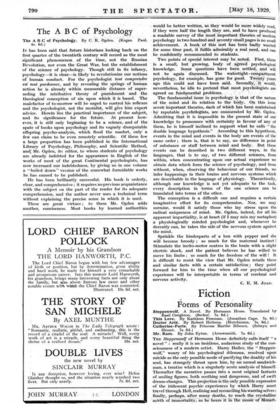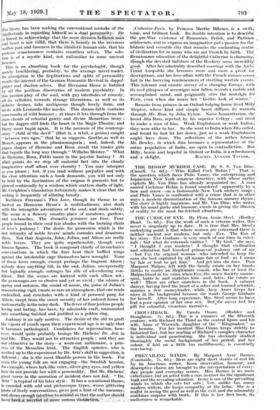Fiction
Forms of Personality
Steppenwoff. A Novel. By Hermann Hesse. Translated by
Basil Creighton. (Seeker. 7s. 6d.) -
Mr. Barn. By John Eyton. (ArroWsmith. 78. 6d.) THE Steppenwolf of Hermann Hesse definitely calls itself "a novel " : really it is an insidious, audacious study of the con- sciousness of a modern artist. Harry Haller, the " Steppen- wolf," weary of his psychological dilemma, resolved upon suicide as the only possible mode of pacifying the duality of his soul, has strangely thrust upon him, by an unreal sandwich- man, a treatise which is a singularly acute analysis of himself. Thereafter the narrative passes into a most original fantasia of smiling figures, both soothing and dangerous, and of swift dream-changes. This projection is the only possible expression of the iridescent psychic experiences by which Harry must travel through Hell, realizing and reconciling his warring selves ; finally„ perhaps, after many deaths, to reach the crystalline 'mirth of inunortalitY, as he hears- it in 'the Musit of Mozart. For Harry has been making. the conventional mistake of the intellectuals in .regarding 4/itself _as_a_xhitil .4)erstinalit3. He roveci .t,p_acknowledge that the mere diVisionliefeeca'm4n. and beast is not lid, thui th0.e.ii:hei.ititY in the ravenous wolfish part and baseness in the idellistie human side, that his protean consciousness contains countless selves. The solu- tion is of a mystic kind, not unfamiliar to some ancient heresies.
This is an absorbing. book •- for the ;psychologist; though merely bewildering, probably; to the average novel reader. Its absorption in the duplications and splits of personality recalls the interest cif -the German Romantic Revival in doppel- hanger and shadow-selves. But Hermann Hesse is fortified by all the perilous discoveries of modern psychiatry. In this passion play Of the soul, with gay interludes of comedy, all its velleities towards strange liberations, as well as its definite desires, take ambiguous though lovely form, and invite with Leonardo-like masks. This dream-fable contains somersaults of wild humour ; at times it lets through from the stars chords of celestial gaiety and divine Mozartian irony ; but the dagger still finds the heart in the Magic Theatre, and Harry must begin again. It is the neurosis of the contemp- orary "child of the devil "(that is, a 'rebel, a genius) caught "between two ages," that he so suggests. Goethe, as well as Mozart, appears in the phantasmagoria ; and, indeed, the pagan shapes of Hermine and Rosa recall the tender girls that beguile the long way through" Wilhelm Meister." What do Hermine, Rosa, Pablo mean in the psychic fantasy ? At what points do we step off material fact into the cloudy imaginative stuff afloat over eternity ? You may interpret as you please ; but, if you read without prejudice and with the close attention such a book demands, you will not only be held by the fascination of the enigma it presents but be pierced continually by a wisdom which scatters shafts of light. Mr. Creighton's translation fortunately makes it clear that the writing is frequently of alluring beauty.
Kathleen Freeman's This Love, though its theme be as limited as Hermann Hesse's is multitudinous, also deals with the intangible adventures of the soul, and deals subtly. The scene is a flowery country place of meadows, gardens, and sea-beaches. The dramatis personae are four. Four people bound in their cool fair abodes with the burning chain of love's jealousy! The desire for possession which is the last infirmity of noble lovers, minds corrodes and denatures them. Not that Augusta, John, Julian, and Alison are really noble lovers. They are quite reprehensible, though very human figures. The book. ik Composed chiefly of inconclusive conversations in which the four beat their baffled wings against the intolerable cage themselves have 'wrought. None of them loves enough, except perhaps the fragrant Alison ; nobody does anything-till, in the end, Julian, unexpectedly but logically enough, outrages his role of all-enduring con- fidant. But the scenes are knitted with such silken,. wit ; the personages are so elusive and yet so vivid ; the odours of spring and autumn, the sound of music, the pulse of Julian's remembering vigil, create so rare an atmosphere, that one reads enthralled,. and concludes with a kind of personal pang for Alison, swept from the Sweet security of her ordered hotise to wait mortally in the rainy dark. The fever of four jealous people loving and hating, has been, by admirable craft, transmuted into something finished and justified as a golden ring.
Jealousy is:an ugly .motive.- The desire of the old to graft the vigour of youth upon their experienced age is so ugly that it becomes pathological. Candidates for rejuvenation, how- ever, would quite probably besiege Mr. Hichens' Dr. Ariz in real life. They would not be attractive people ; and they are not attractive in the story—a worn-out millionaire, a prhi- eess of the Messalina kind. The English spinster, who is worked up to the experiment by Dr. Artz's skill in suggestion, is different ; she is the most likeable person in the book. For even the young folk are not engaging—the Swedish heroine, for example, whose lark-like vOicersilver-grey eyes, and yellow hair do not provide her with a personality. But Mr. Hichens' great verve in the narration of incident does not fail.. "Dr. Arts" is typical of his later style. It has a sensational theme, Is crowded with odd and picturesque types, wears 'glittering paste of lively conversations, gives just a hint of the uncanny, and shows enough intuition to:reinind,US that the author should hav011feil=6-.110YOtifit re-seliCRIS'aistifirti144' -I ... .. _ -mellowness is remarkable. zratherine-Paris, by Princess Marthe Bibesco, is a swifts tonic, and brilliant book. Its 'double intention is to describek the pre-War existence of Rumanian, Polish, and Parisian- „. arisiocrats, and to express an imaginative girl's passion for the- hiStmic and versatile city that remains the enchanting centre , of civilization for so many who are not French by birth. The Renaissance education of the delightful Catherine is charming; though the devoted habitues of the Rookery seem ineredib15?, . good. After her admirably described marriage with the Arch.; C;c:a.int Leopolski she becomes more and more a pivot for descriptions, and her love-affair with the French airman seems lost_in the hurrying reminiscences of startling wartide event s, This tolerant and caustic survey Of. a changing Europe, with Ifs - cool glimpses of sovereigns now fallen, reveals a mobile and accomplished mind, ,and poignantly stirs the nostalgia for Paris, even when she *eats her. '!.Gothic look of winter."
Remote from princes in an Oxford lodging house lived Mill* Steptoe, whose kind and simple heart diffuses its warmth through Mr. Rant, by John Eyton. _Naive humanitarian, she, loved Jita Ram, rejected by his superior College ; and tried. , to make a man of him. Weak Englishman or weak Indian; they were alike to her. So she went to India when Jita called; and found he had let her down, just as a weak Englishman might have done. The reflections of the rather fatuoua Mr. Bewley, in which Jita becomes a representative of the' entire population of India, are Open to contradiction. But Milly, heroic and hopeful in Oxford or India, is a refreshment ,













































 Previous page
Previous page